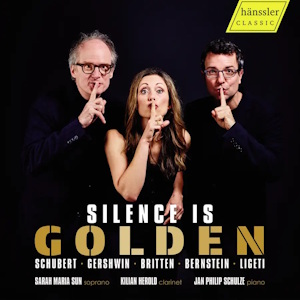
Silence is Golden
Sarah Maria Sun (soprano)
Kilian Herold (clarinet); Jan Philip Schulze (piano)
rec. 2024, Sendesaal, Bremen, Germany
Hänssler Classic HC24016 [74]
Hänssler are branding this ingenious and diverting new recital as ‘dramedy’. I think that’s fair. Much of the content is concerned with ‘heavy’ subjects, but the way in which they’re treated by the various composers here is so inventive that if anything there is a danger that one’s normal distaste or even horror is completely sublimated into laughter and sheer musical enjoyment. That’s at least partially the point I suppose. All of the pieces are skilfully written or arranged for the combination of soprano, piano and clarinet, or a subset of the three.
The album starts with a terrific performance of Schubert’s The Shepherd on the Rock. Sarah Maria Sun’s voice is perhaps not as lyrical here as in some interpretations but texturally it’s well integrated with Kilian Herold’s polished clarinet tone and Jan Philip Schulze’s sensitive piano. This might be the first classical piece one thinks of for this combination of instruments of course but what exactly is doing on this album? The booklet notes tell us that ‘Spring’ (the subject of the text Schubert uses for the final section of the work) is apparently a cipher used by Schubert’s circle for their desire for political change after 1815 during Metternich’s secret police regime. Interesting, albeit some tenuous thematically.
Next comes a warm and authentic rendition of Gershwin’s The Man I love, followed by an absolutely riveting performance of Britten’s Cabaret Songs from Sun and Schulze. I loved everything about this. Sun has the idiom down to a tee and her diction is superb, all of Auden’s lyrics clearly presented in their alternately showy, schmalzy and touching glory. And how thrilling Britten’s inspired settings feel when performed like this. It’s definitely one of the highlights of the album.
Following that with Pasek and Paul’s infamous In Short is brilliant programming. If you don’t know the piece, you might want to brace yourself. It’s shockingly brutal and violent in places, yet also extraordinarily deft and quick-witted. I found myself laughing aloud at points even though I felt I shouldn’t be. As in the Britten, Sun and Schulze sound as if this music was made for them.
After that Bernstein’s What a movie comes as a slight anti-climax, well performed as it is, but the performance of his op. 1 Sonata for clarinet and piano which follows is really beautifully performed by Herold and Schulze. They rightly lean on the jazz and blues influences in their playing, Herold’s clarinet sounding positively Goodmanesque in places. There’s real substance and musical invention here, a piece that should be heard more often. As far as I know there is no narrative to neatly fit the piece into the thematic world of the album but with playing as lovely as this who cares?
Ligeti’s Three Choral Songs after Attila Josef follow this, and they feel different to everything else on the disc. They are settings by a compatriot of Ligeti’s, who tragically committed suicide at the age of 32. The young Ligeti’s choice of art song at a time of political repression (Hungary in the 1950s) was courageous and he had to compose the pieces in secret. Clear and spare, albeit full of emotion they intriguingly have pointers to other, happier eras, not least in the final song Jöji, testvékém (‘Come, my brother’) which recalls Schumann’s Mondnacht. They are poignantly sung here by Sun even if musically their mood is somewhat out of keeping with most of the other pieces in the recital.
The premiere recording of George Aperghis’ song Le Rire Physiologique is next. The premise is original: the singer is lecturing an audience on the physiology of laughter and the pianist is trying not to laugh. It’s performed with resolution, but the piece is overlong, its unique selling point quickly exhausted.
Steven Lutvak’s I don’t understand the poor is a lot more enjoyable than the Aperghis, very much comedy on the edge. Well performed, genuinely funny satire, which I think stops short of being offensive given it’s the highly upper class persona voicing the song which is being lampooned, but, well, see what you think. Sun again renders the song exquisitely, a wonderful actor as well as singer.
Finishing with Ligeti’s Mysteries of the Macabre was a bold choice. They are a summation of the three arias of Gepopo who is the head of the secret police in Ligeti’s opera Le Grand Macabre. It’s a highly demanding, often grotesque monologue which the three performers launch into with absolute commitment, in a new arrangement they have devised themselves, which amongst other things involves Herold virtuosically switching between clarinet and bass clarinet during the course of the piece. It’s very well done, Sun at times terrifying, but also allowing us a peek at the contradictory nature of the character.
So, an enjoyable, entertaining, thought-provoking album. I did feel that there is a slight loss of momentum from the Ligeti songs onwards, which might perhaps have been avoided by different ordering, but it’s not a major problem. The lack of texts and translations for the Ligeti in particular is more of an issue and did initially lessen the impact of those compositions for me, especially as they were not easy to locate online. A real shame.
Dominic Hartley
Buying this recording via a link below generates revenue for MWI, which helps the site remain free


Contents
Schubert: Der Hirt auf dem Felsen, D965
Gershwin: The Man I Love
Britten: 4 Cabaret Songs
Benj Pasek and Justin Paul: In Short from Edges
Bernstein: What a Movie! from Trouble in Tahiti
Bernstein: Clarinet Sonata, Op. 1
Ligeti: 3 Lieder nach Attila József
Aperghis: Le rire physiologique
Steven Lutvak: I don’t understand the Poor from A Gentleman’s Guide to Love and Murder
Ligeti: Mysteries of the Macabre

















